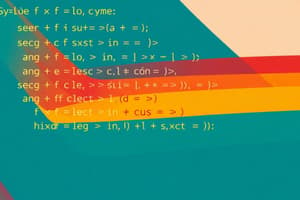Podcast
Questions and Answers
What are the fundamental units of C++ language?
What are the fundamental units of C++ language?
Character set
What are tokens in C++?
What are tokens in C++?
- Keywords
- Identifiers
- Literals
- All of the above (correct)
What do keywords convey in C++?
What do keywords convey in C++?
Specific meaning to the language compiler.
What are literals in C++?
What are literals in C++?
Identifiers are user-defined words in C++.
Identifiers are user-defined words in C++.
What is the purpose of operators in C++?
What is the purpose of operators in C++?
Which of the following is an example of a special operator in C++?
Which of the following is an example of a special operator in C++?
How can you perform multiple inputs in C++?
How can you perform multiple inputs in C++?
In C++, floating point constants are expressed in ______.
In C++, floating point constants are expressed in ______.
Flashcards are hidden until you start studying
Study Notes
Overview of C++ Concepts
- Understanding basic C++ concepts is crucial for advancing in subsequent programming topics.
- The chapter serves as a refresher on C++ language skills learned in Class XI.
- Core topics include selection statements, looping statements, nested loops, and control statements like break and continue.
Basics of C++
- C++ utilizes a character set as the fundamental unit of its language.
- Character set includes letters (a-z, A-Z), digits (0-9), special characters (#, ;, :, etc.), and whitespace characters.
Tokens in C++
- Tokens are the building blocks of C++ programs, made up of one or more characters.
- Types of tokens:
- Keywords: Reserved words with special meaning.
- Identifiers: User-defined names for variables, functions, etc., governed by specific rules.
- Literals: Constants that remain unchanged during execution, classified into:
- Integer constants: Digits with optional sign.
- Floating-point constants: Numbers expressed in fractional or exponential forms.
- Character constants: Single characters in single quotes.
- String constants: Character sequences in double quotes.
Operators in C++
- Operators signify operations in code and are categorized based on the number of operands:
- Unary: Operate on one operand.
- Binary: Operate on two operands.
- Ternary: Operate on three operands.
- Types of operations include:
- Arithmetic: (+, -, *, /, %)
- Relational: (=, ==, !=)
- Logical: (&&, ||, !)
Input/Output Operations
- Input operation in C++ employs the extraction operator (>>) with two operands:
- The first operand is
cin, which identifies the keyboard as the input source. - The second operand is a variable to store the input.
- The first operand is
- Multiple variables can be processed in one input statement, e.g.,
cin >> a >> b >> c;.
Program Structure and Essentials
- Familiarity with fundamental program structure is necessary, including:
- Header file specifications.
- Data type sizes.
- The GNU Compiler Collection (GCC) and Geany IDE are used for C++ program development.
Studying That Suits You
Use AI to generate personalized quizzes and flashcards to suit your learning preferences.




